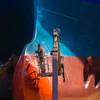Shipments of limestone on the Great Lakes totaled 1.8 million tons in April, a decrease of 9 percent compared to the month’s five-year average, and a drop of 30 percent compared to 2012, the last April in which ice conditions were not near arctic, according to the Lake Carriers’ Association (LCA).
Heavy ice cover on the Lakes was the major factor behind the decreases. The ice formations were so formidable that the U.S.-flag Class V lakers that are heavily engaged in the stone trade collectively delayed their sailings by 60 days compared to 2014. Class V lakers are vessels that range in length from 600 to 649 feet and can transit rivers such as the Cuyahoga in Cleveland or the Saginaw River in Michigan.
Cold temperatures also slowed the resumption of mining at several quarries. Only 510,000 tons of aggregate and fluxstone had moved by mid-month.
Efforts to get more icebreaking resources on the Lakes are moving forward. Rep. Candice Miller (R-Mich.) included a provision in the Coast Guard Authorization Bill approved by the House Transportation and Infrastructure Committee that directs the U.S. Coast Guard to design and build a new, multi-mission icebreaker to enhance its capabilities on the Great Lakes. The past two winters have been so brutal that millions of tons of various cargos have gone undelivered and that has cost the economy hundreds of millions of dollars in economic activity and thousands of jobs.












